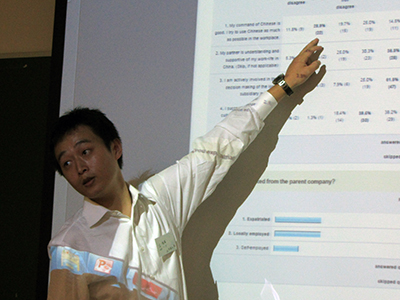At the 2012 Autumn Meeting of the Association of Japanese Geographers in Kobe JI Weiwei presented his research entitled “Managing multinationals in China: Beyond communities of practices”. JI Weiwei studied under the supervision of Professor Schlunze since 2007 for his master and doctoral thesis. He became one of the main contributors on theoretical and methodological developments of our research group SIEM. His research is concerned with the creation of communities of practice for global managers.
On 14 September 2012 he presented the core part of his doctoral thesis, which is a comparative study of preferences-adjustment-network behavior of managers in China. Results of analyses were collected from individuals including Japanese managers (n=75) and European managers (n=87) working in China. The results showed that communication orientation and feelings of integration are significantly related with synergy creation.
Japanese managers and European managers showed significant differences in preferences and network behaviors. The research results imply that foreign managers who are eager to succeed in the intercultural workplace by creating cultural synergy need to undertake the effort to achieve cross-cultural competence. Successful boundary spanner managers upgraded their cross-cultural competence in a learning process about the particular local business environment by adaptation to local management practices and the application of global practices. The findings also imply that the headquarters of MNCs should try to learn from these boundary spanners proactively how to balance global and local management practices. The development of an adequate global HR strategy could empower those organizations to build cross-cultural competence with more global competence.
He will receive his doctoral degree on 22nd March 2013. We wish him the very best for his academic career and hope that he becomes a leader promoting our research agenda and widening our research network within East Asia.

